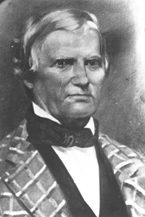
Photo info …
Credit: Public domain via Wikimedia CommonsView Source
(Apr. 6, 1786-Nov. 16, 1858). Robert Hanna Jr. was born in Laurens District, South Carolina, to Robert Hanna Sr. and Mary Parks, both originally from Prince Edward County, Virginia. The Hanna family settled in Indiana Territory after its establishment in 1800 before moving north of Brookville, Indiana, sometime between 1802 and 1804.
Territorial Governor William Henry Harrison appointed Hanna sheriff of the eastern portion of the territory in 1809. Two years later after the establishment of county lines, Hanna became the duly elected sheriff of Franklin County, a position he held until 1820.
Hanna was elected as one of the 43 delegates to the Indiana State Constitutional Convention that met at Corydon in 1816. Delegates considered statehood for the Indiana Territory and drafted the state’s first constitution. After the territory achieved statehood, Hanna served as brigadier general of its 6th Brigade, 3rd Division, in 1817.
In 1820, Hanna became the first registrar for the U.S. Land Office in Brookville. When the Indiana General Assembly relocated the agency to Indianapolis in 1825, Hanna followed and continued as registrar until 1830.
In Indianapolis, Hanna became involved in the construction of the and was an investor in a steamboat that bore his name. After a successful trip from Cincinnati to Indianapolis along the on April 11, 1831, the steamboat ran aground on the return trip. Efforts to navigate the White River ceased until others tried again, also unsuccessfully, in 1865.
Indiana governor Noah Noble appointed Hanna to the U.S. Senate upon the death of Senator James Noble in 1831. He served four months of the term from August 19, 1831, to January 3, 1832.
Back in Indianapolis, Hanna served in both houses of the General Assembly. He served four terms as a member of the House of Representatives and represented Marion County in the State Senate toward the end of his political career (1840-1841; 1842-1846). He failed in his bid for election to the second State Constitutional Convention in 1850.
Eight years later, Hanna died instantly after a locomotive struck him while he walked along the Peru and Indianapolis railroad tracks in Indianapolis.

Help improve this entry
Contribute information, offer corrections, suggest images.
You can also recommend new entries related to this topic.

